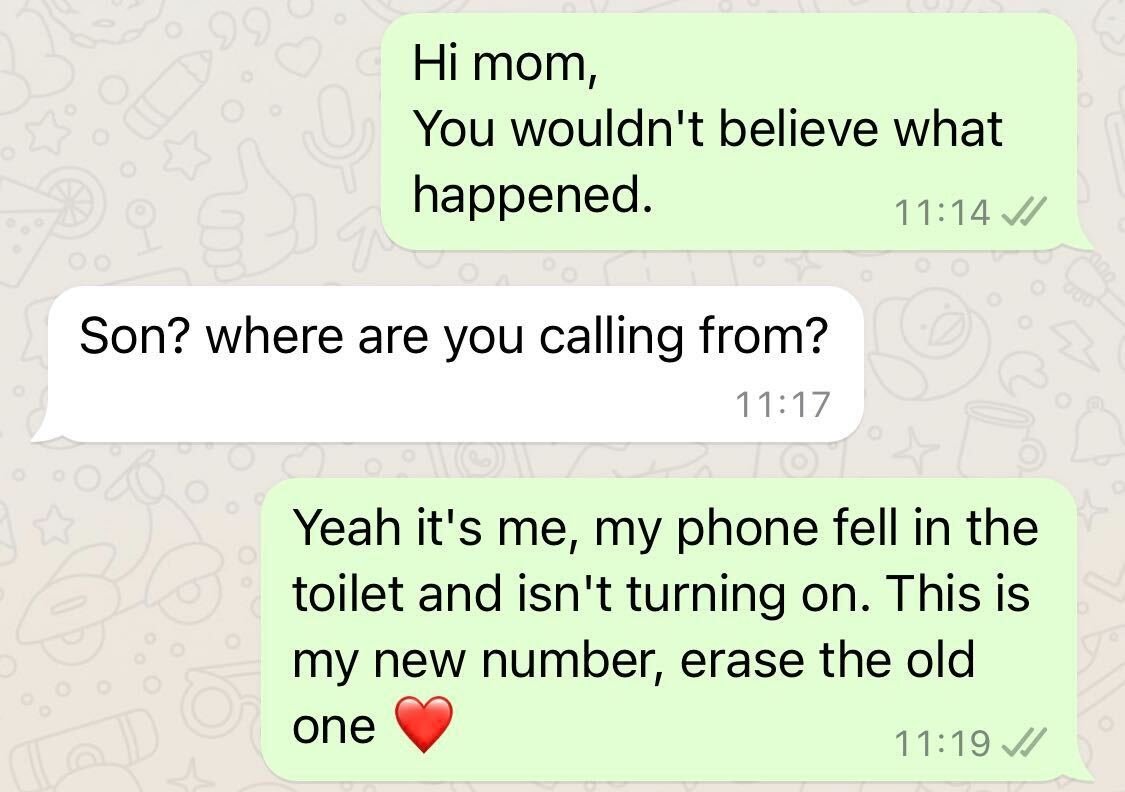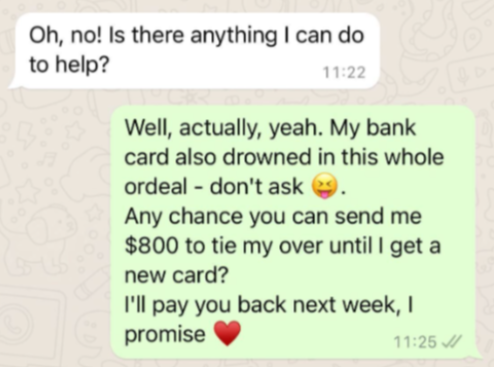'Hi Mom' WhatsApp Scam: How It Works and How to Avoid It

Key Takeaways
- It pretends to be your child in trouble: You get a WhatsApp message like “Hi Mom, this is my new number” followed by a story about a broken phone and an urgent request for money.
- It plays on panic and love: Scammers rush you with emotional stories so you’ll send money (often via gift cards or transfers) before stopping to think.
- A new number is a big red flag: In most cases, people keep the same phone number even if they change or break their phone, so a sudden “new number” message should make you pause.
- Always verify before sending money: Call your child’s old number, ask personal questions, or try a video call. If they avoid speaking live, that’s a warning sign.
- Use extra protection: Turn on WhatsApp’s 2-step verification, never share login codes, and be cautious with unknown links or urgent payment requests.
When a brand becomes a verb, it's living proof of the impact and influence it has on our daily lives. "Googling" for example, has become synonymous with searching for information online. "Ubering", a common way to refer to hailing a ride somewhere. Similarly, "WhatsApping" has become a verb for sending instant messages and staying connected with others.
With over 2 billion users worldwide and a mind-boggling 100 billion messages sent daily, WhatsApp is clearly a leader in the world of text messaging apps. Yeyyy for WhatsApp, right? Well, yeah, as a tool to send messages, it’s great, but just like all brilliant tech tools, there are always cyber-criminals and scammers ready to exploit them for their own financial gain. The latest "Hi Mom" scam is just one example of how scammers are using WhatsApp to trick people out of their hard-earned cash.
In this article, we'll focus on the latest WhatsApp scam dubbed 'Hi Mom' - great name for a scam, horrible outcome for the victims. As per usual, we’ll equip you with tips on how to avoid it, and by the end of this article, you’ll have the tools to navigate WhatsApp safely. Let's jump right in.
{{component-cta-custom}}
WhatsApp, How It All Started
Back in 2009, the world was introduced to WhatsApp. The app's user-friendly interface and the commitment to ensure secure conversations via end-to-end encryption were key factors in its extensive consumer adoption.
In 2014, Facebook, or Meta as we know them nowadays, acquired WhatsApp for a . The acquisition was meant to bolster the reach and capabilities of both companies, but it also opened the door to new security challenges and vulnerabilities.
While initially WhatsApp was recognized as a leader in digital security, as time passed, that started becoming more and more ironic. Fast forward to today, what was once considered a stronghold of privacy and protection is now making headlines as a hunting ground for hackers and scammers.
The 'Hi Mom', WhatsApp Scam
From changing diapers to nurturing growth, parenting is a journey filled with countless responsibilities and endless worries. As the kids grow older and finally leave the house, parents can breathe a sigh of relief, knowing they’re children are doing well. Or are they?
Suddenly a familiar message pops up, and parental instincts kick in. It's a desperate cry for financial help, bundled with words of love and a subtle dash of guilt. Welcome to the world of the latest WhatsApp scam: the notorious "Hi Mom" scam.
Scammers have caught on to something crucial - parents' unwavering willingness to help their kids. They've learned how to exploit that unconditional love, and it's how they're preying on that vulnerability.
{{component-did-you-know-custom}}
Here’s How It Plays Out
If you're a parent, you've probably heard this line countless times: "Hi mom, my bank card is busted. Can you send me (insert $ amount here) to help me out? I promise I'll pay you back." Or if you've ever found yourself on the other side of this conversation, and have been in a jam, hopefully, your parents were nice enough to bail you out. This narrative is exactly the emotional engineering these scammers use in order to reel you in. What’s even more upsetting? The scam specifically targets vulnerable groups, with women over 50 being their primary prey.
The scam kicks off when a parent receives a WhatsApp message from an individual posing as their own kid. The imposter then explains that they have a new number because something horrible happened to their phone. It fell in the toilet, broke, was stolen, got eaten by a shark, or any other imaginative excuse they believe will be a plausible explanation for a new number.

Nowadays, all of our contacts are saved on our mobile phones. If you update, replace, or erase a contact's number, you’re more than likely not able to contact them, at least not immediately. So Whatsapping “Hi mom, this is my new number, erase the old one” is a sneaky way for the scammer to assume the identity of the victim's child.
Once that first connection is formed, the scammer starts spinning a yarn of misery or an urgent crisis designed to tug at the victim's heartstrings. Next comes the plea for financial help, often asked for in the guise of gift cards or money transfers.

This is a classic case of manipulation or in other words Once they've gained trust, the scammer starts using clever tactics to manipulate the situation. They might claim that their online bank account is having issues or that they've lost important files and pictures. The goal? To get the victim to react fast, without taking a moment to question the situation, and then trick them into handing over money or personal information.
We’re not sure where the scammers get information like the victims phone number, family status, number of kids, etc. If we had to guess, we’d bet on the . We’ve mentioned this in previous articles, but in short, every time you shop online, comment on someone's Instagram post or even go to your online banking account, your information may be at risk. And if by any chance you get hacked, or there’s a , then it might be up for sale on the dark web.
So while you may think the “Hi Mom” WhatsApp scam isn't directly connected to online security, it definitely is! That’s why it’s important to have security tools that keep you out of trouble before you get that scammy WhatsApp message from your “child”.
Take , for example, it warns you whenever you’re about to open a website or download a file designed to damage your computer or security. It constantly searches malicious sites for your information and email address and, more importantly, scours the dark web for your data and alerts you if it shows up. Best of all, Guardio comes with a 7-day free trial.
WhatsApp Scams - Your Guide to Staying Safe
Given the , it's crucial to be in the know and equipped with the right tools to protect yourself from WhatsApp scams. Rather than falling into the trap and dealing with the aftermath, wouldn't it be better to stop these scams before they even happen? We think so too! That's why we've compiled a handy list of tips to help you prevent WhatsApp scams and keep your digital life secure.
The Unknown Message Dilemma
If you receive a message from an unfamiliar sender claiming to be from a well-known organization like PayPal, here's a trick for you. Long-press the link provided and examine the web address that pops up. Does it match the official PayPal website? If not, proceed with caution and steer clear of clicking any suspicious links.
You can also copy the link to your desktop web browser, if you have Guardio’s Chrome extension installed, then it will immediately alert you if the link is fishy.
When it comes to “Hi Mom” or other social engineering scams, it’s a bit trickier. If someone messages you claiming to be your child, give them a call. If they don’t answer or claim their mic is busted, that should be a definite red flag. Try calling their “old number” or asking them personal questions. In other words, verify if the old number isn’t working and don’t immediately believe everything they say.
Nowadays, even if your phone breaks, your number stays the same. Mobile providers don’t give you a new number, at most they’ll offer you a new sim, with the same number. So whenever getting a text from an unknown number, proceed with caution.
The Money Mystery
It's not uncommon to receive messages asking for money from unknown numbers, claiming to be someone you know. Don't panic! To reiterate the previous point, before taking any action, play it safe. Contact the person directly to verify that it truly is them. A quick call or text can save you from becoming a victim of a sneaky scammer.
Step It Up with 2-Step Verification
Activate WhatsApp's 2-step verification feature to add an extra layer of security to your account. Once enabled, the app will send a verification code to your default device whenever someone tries to log in from a different device. This extra step ensures that you are in control of your account and keeps unwanted intruders out.
Note, that scammers often try to manipulate this method. If you ever receive a verification code, , don’t share it with anyone.
Grammar Test
Pay attention to the language used by unknown contacts. Does it sound familiar? Are there any grammar or spelling errors that seem off? Trust your instincts and be cautious if something doesn't feel right. It's better to be safe than sorry.
The Urgent Payment Plea
Scammers often pose as representatives from banks or mobile phone providers, bombarding you with urgent payment requests. When faced with such a message, take a step back and consider its legitimacy. Reach out to your bank or service provider through their official website or phone number to verify the authenticity of the request.
Safe Digital Navigation
Platforms like WhatsApp are an important part of our everyday communication, but they also provide fertile ground for scams. The WhatsApp "Hi Mom" scam is just one sobering example of the lengths scammers will go to exploit trust and family ties.
The best line of defense is being aware of the dangers out there and thinking before taking any actions. Online security tools like Guardio’s Chrome extension can give you that extra layer of protection and send you essential alerts if you’re data is ever compromised. Remember, always question unexpected requests and verify where they’re coming from. Your judgment is the ultimate line of defense against scams. So, stay safe, be cautious, and continue WhatsApping securely.
{{component-tips}}
Conclusion
When a platform becomes part of our everyday language, it’s easy to forget that convenience and familiarity can also create opportunity for abuse. The “Hi Mom” scam is a powerful reminder that even the most trusted apps can be weaponized through emotional manipulation and social engineering. By impersonating loved ones and creating a false sense of urgency, scammers rely on instinctive reactions rather than careful thinking, and that’s exactly where the danger lies.
The good news? A little awareness goes a long way. Verifying unexpected messages, enabling built-in security features like two-step verification, and using proactive protection tools can dramatically reduce your risk. WhatsApp itself isn’t the enemy, complacency is. Stay alert, question urgency, and always double-check before you act.
{{component-cta-custom}}
FAQs
What is the Hi Mom WhatsApp scam?
It's an impersonation scam where criminals pretend to be your child using a new phone number and urgently ask for money.
- It starts with a message like “Hi Mom, this is my new number” followed by a believable excuse (lost phone, broken SIM, stolen device).
- The scammer creates urgency, claiming they can’t access their bank account and need fast help.
- They request hard-to-trace payments like gift cards, bank transfers, or payment apps.
- They pressure you to act quickly and keep it quiet, preventing you from verifying the story.
Learn more about how these tactics work in our guide to what are social engineering attacks.
How can I verify a WhatsApp contact quickly?
The fastest way to verify a WhatsApp contact is to pause the conversation and confirm their identity through a second, trusted channel.
- Call their original number directly, don’t use the number that just messaged you.
- Ask a personal question only your real contact would know (avoid answers that are easy to find on social media).
- Request a quick voice note or video call to confirm it’s really them.
- Never send money or codes until you’ve independently verified the request.
Review the warning signs in our guide to how to identify and avoid phishing scams.
What should I do if I already sent money to a scammer pretending to be my child?
Act quickly, fast reporting can sometimes limit the damage.
- Contact your bank or payment provider immediately and request a freeze or reversal.
- Report the number on WhatsApp and block it to prevent further contact.
- Change passwords for banking and email accounts if you shared any details.
- Scan your email and devices for additional phishing attempts that may follow.
If you're unsure what steps to take next, follow this recovery checklist on what to do after clicking a phishing link.
How do scammers know I have kids or get my phone number in the first place?
Scammers often piece together personal details from data leaks, social media, and exposed online profiles.
- Limit public posts about family members, birthdays, and phone numbers.
- Check if your email or number was exposed in a past breach.
- Remove unnecessary personal details from old accounts you no longer use.
- Use identity monitoring tools to detect if your information appears on the dark web.
Learn how exposed data fuels scams in our breakdown of data breaches explained.
How does Guardio actually stop scam links from reaching me?
Guardio blocks malicious websites and phishing pages before they can load in your browser or on your phone.
- Real-time browsing protection stops dangerous links instantly.
- Malicious download blocking prevents harmful files from installing.
- Email Security alerts flag phishing emails that slip past spam filters.
- Text Message Filtering (iOS) sends scam texts straight to junk.
See how these layers work together in our overview of what Guardio does.
Can Guardio protect my whole family from scams like “Hi Mom”?
Yes, one Guardio account can protect multiple devices and family members under a single plan.
- Invite family members to your Premium plan in just a few clicks.
- Protect up to 5 devices across desktop and mobile.
- Monitor multiple email addresses for breach alerts.
- Set up critical security alerts for high-risk scam attempts.
Learn how to extend protection to everyone you care about in our guide to cybersecurity for families.








